Introduction
Bahamian Economy
The economy of The Bahamas is strongly shaped by aspects of the growth of touristic services and packages, foreign dominance of its main sectors, development of financial services, foreign capital inflows as well as a state revenue collection through indirect taxation (primarily of the import customs), while evading taxation on earnings and corporate gains (Karagiannis and Madjd-Sadjadi, 2011 p.96).
Analysts perceive the potential of high volume tourism for increasing income levels and boost employment opportunities for locals that has significant influence in foreign exchange earnings. Nevertheless, this nature of tourism services is highly susceptible to international political economy, foreign exchange, prone to global environmental problems, and external shocks (Karagiannis and Madjd-Sadjadi, 2011 p.96).
The Bahamian economy is modelled to structurally and technologically dependent due to disparities in the trend of domestic market demand and the type of good supplied (Karagiannis and Madjd-Sadjadi, 2011 p.97). A wide range of economic transactions in The Bahamas are associated with foreign trade.
Activities in the agricultural sector are less developed to the extend that a large quota of food products is sourced from outside the country in order to meet the demand. Population growth and tourism boom are the main factors contributing to food deficits. Consequently there has been an exponential growth in the food import bill as well as a decline in the balance of payments (Karagiannis and Madjd-Sadjadi, 2011 p.97). This has caused challenges in diffusing financial benefits from the tourism into other sectors of the economy.
Lottery in The Bahamas
Gambling premises particularly casinos were inconsistent and have influenced the economy of the Bahamas for over 9 decades (Boxill 2009, p.3). Lottery activities particularly in casinos are designed to favour tourism development.
Sources from the government of The Bahamas indicate that the first of gambling casinos in the name of the Bahamian Club opened for business from the capital of Nassau towards the close of the 1920s decade (Boxill 2009, p.3). Later, another gambling premises was opened by the name Cat Cay (Boxill 2009, p.4).
The two premises had a small capacity for patrons and centred on attracting tourists. They operated fully during the winter seasons. The lottery activities served as complimentary for other entertainment experiences for the tourists. In the 1960s decade, there was a boom in the casino gambling business throughout the archipelago; with the Play Boy Casino set up in 1978, but later closed in 1983 (Boxill 2009, p.4). By April 2009, there was an approximate five gambling casinos doing business in The Bahamas.
The traditional paper lottery is now challenged by the online version known as the web shop gaming. This form of virtual gambling eases the need for physical presence during the lottery activities. Participants experience a simulated experience close to the physical one.
In a bid to regulate casino gambling, The Bahamas put in-place the Lotteries and Gaming Act in 1969 (Boxill 2009, p.4). The Act was later amended for public ownership of casino premises. The amended act allowed the Hotel Corporation of The Bahamas to have the monopoly license for carrying out business of gaming at any establishment (Boxill 2009, p.4). In addition, an operator was issued with a license to manage a gambling casino. Licenses were to be issued after consensus between the minister overseeing gaming and the Gaming Board.
As provided in the official government website, the Gaming Board is vested with the mandate to regulate the lottery activities (Boxill 2009, p.4). The mandate is mainstreamed within a range of stipulated activities. The Board shall update the status according to the extent, character and geographical site for gaming establishments operated by a premises as per the issued license.
The Board shall screen the lottery business as per guidelines of the act, so as to rid off any criminal elements in the industry. The Board shall offer Certificates of Approval as well as Permits to prospective employees intending to operate, supervise or manage gaming. The Board maintains close vigilance on the Certificate and Permit holders for any malpractices or contravention.
The Board shall cause the initiation of amendments to the Gaming Act as well as provide advise to the Minister in this regard. The Board liaises with the respective associations in gaming to inform on any developments as well as technological advances within the industry as a way of keeping abreast. Finally, maintain ties with the International Gaming Regulators for information exchange.
Lottery amenities have to directly pay to the government of The Bahamas four forms of gaming levies, that is application levy for casino personnel, basic taxes, levies for permits and certificates as well as winning taxes (Edwards, 2009, p.33). Based on the Casino Taxation Act rates levied are proportionate to the floor space occupied.
In addition, winnings during games are charged taxes but to some limit. The highest amount of basic taxes charged on casinos based on the business type is US$ 200 000 (Edwards, 2009, p.33). Taxes on winnings are calculated as 25 percent of the gross.
Table 1: Lottery Taxes to The Government between July 1999 and June 2000
Source: Edwards (2009, p.34).
The above table implies that table winning is the major source of government revenue (at US$ 19 369 273).
Table 2: Over the Time (From 1993 to 2003) Annual Expenditure Data By the Gaming Board of The Bahamas
Source: Edwards (2009, p.36).
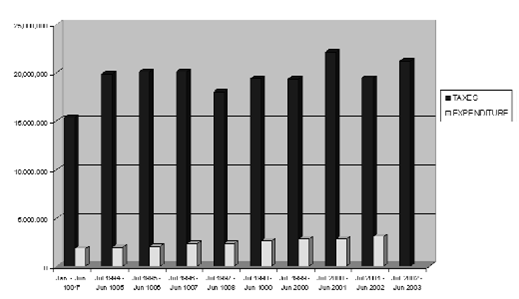
Based on the Gaming Board expenditure figures and annual revenue for 2002/2003, it is evident that the government remains with a net revenue earning of 85 percent that is utilized within the Bahamian economy for other services.
Taxation of Lottery Amenities
Globally, The Bahamas provide a model of how the government ceases control and legalises gaming activities leading to positive impacts in tourism resort-based casinos as a social facility which attracts more than 4.5 million international visitors (Edwards, 2009, p.21). Lottery facilities provide jobs, government taxes, foreign exchange earnings as well as investment opportunities.
The initial efforts to raise tax revenue from lottery activities in The Bahamas was in 1964 through a legislation- the Casino Taxation Act of December 29, 1964. In addition the Act recognised the potential of the lottery activities to develop the tourism industry. With regard to income generation for the state, some quarters remained opposed to the legislation (Edwards, 2009, p.24).
Tax levy was imposed on all casino facilities. Operators (like the Grand Bahamas, New Providence and Cat Cay) enjoying tax exemption were not left out. Concurrently, the Gaming Machines Tax Act was introduced targeting slot machines used in gaming. It was argued the tax revenue generated was partly re-channeled to develop tourism activities in The Bahamas (Edwards, 2009, p.24).
Impacts of Gambling on the Social and Economic Bottom lines
Notably, the locals are legally deterred from engaging in casino gambling games, thus the social contribution has relatively been compared to other places that allow participation.
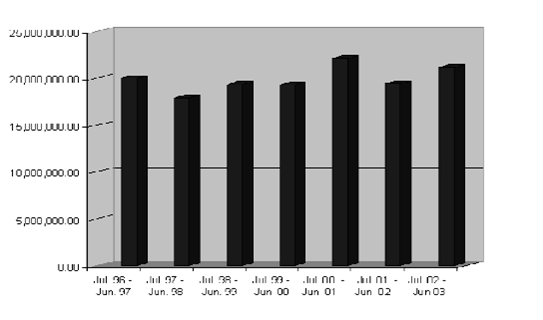
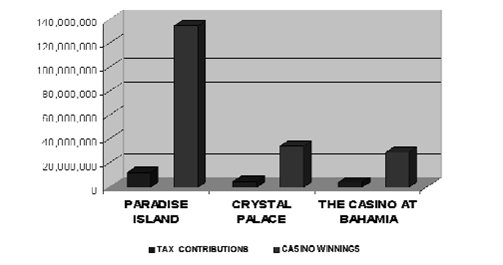
General Economic Contribution of Lottery
Gambling centres like Casinos have the ability to raise income from fees levied on licenses as well as taxes generated from public gross earnings.
The Government of Bahamas indicates that tourism associated activities are lead employer to most locals; thus, contribute largest tax revenue to the state. In the fiscal year of 2002/2003 revenue from winnings indicated that tax collected in 2002 alone amounted to almost US$ 22 million. In total, the American Gaming Association raised gross gambling revenue worth US$92.27 billion in 2007.
Deepwater cruise and cruises revenue accounted for 37.3 percent. The Bahamian fiscal budget for 2007/2008 targeted to raise tax revenue from gambling worth US$ 28 million. A case in point is the Atlantis Paradise Island Resort and Hotel which seconds the government lead employer, nationally at 5500 employees. Out of the total staff, more than 1000 employees are stationed at the premise’s casino. The casino makes annual winning revenue worth over US$134.5 million; while attracting over 5 million visitors from abroad.
Between the period of July1st 2002 and June 30th 2003, the Princess Casino Limited located at the Grand Bahama made over US$ 29 million from revenue winnings. In the same period, the Crystal Palace Casino sited on the Cable Beach raised close to US$ 34.5 million (Edwards, 2009, p.32). By 2008, gross revenue generated within the last seven years remained within the range of $US190 – US$200 million. Two thirds of the national gross domestic product is generated from tourism activities.
Thus, casino gambling has diversified the country’s tourism product. Much as the number of table games is less compared to machine slots, the greater portion of the revenue from the lottery industry comes from them. Take for instance, table games at the Atlantis Paradise Island Casino earned revenue worth US$ 0.9 million in 2002/2003 (Edwards, 2009, p.33). Communication (2012, para.22) explains that staff employed within the virtual web shop gambling contribute more than US$ 1 million to the lottery industry.
Moreover web shop businesses remit more than US$ 100 000 to the government in the form of license fees. Communication (2012, para.28) observes that government’s keenness to regulate can lead to raising of annual tax of up to US$ 20 million from the virtual web shop activities.
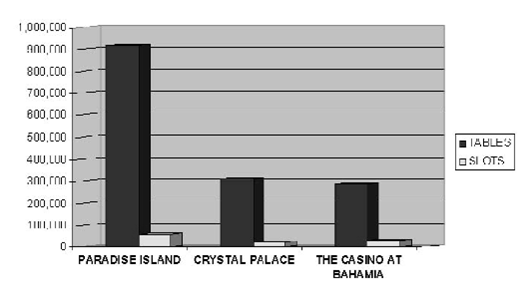
Business Investment In Gambling Amenities
The Bahamas benefits widely from the investment in the casino gambling business by international corporations as well as renowned players in the resort establishments. Edwards (2009, p.21) notes international investors to include Donald Trump, the Carnival Group of Companies, the Ruffin Group, Princess Properties International, Playboy Limited, Resorts International and Sun (Kerzner) International.
Most of these investors have gained interest in The Bahamas since the mid-1960s when the premises were small scale but nowadays have expanded to large scale resorts.
In 1964, the Monte Carlo Casino located at the Lucayan Beach Hotel was the first among the big international investments to be set up in The Bahamas, followed by the El Casino based at The island of Grand Bahamas in 1966 (Edwards 2009, p.21). The Paradise Enterprises Limited under the auspices of the Mary Carter Paint Company opened the Paradise Island Casino on the Paradise Island in 1967.
Nevertheless, the ownership of the Paradise Island Casino changed hands in 1987 to Donald Trump then Merv Griffin in 1989 (Edwards 2009, p.21). Later, it was purchased by the Sun International Hotels in 1994 after which a major face lift and rebranding was one (Edwards 2009, p.21). The growth in the number of gambling amenities gives the indication that the business environment is conducive as well as the return on investment is promising. This is confirmed by the growing number of multinationals attracted to the country.
According to the Communication (2012, para.37) population dynamics and geography of the Bahamas have contributed to the challenges facing the commercialization of national lottery activities. Among geographical challenges is the proximity to the United States of America.
The level of advancement in the lottery activities makes them take advantage of the population dynamics and raise more income from the lottery activities (Communication, 2012, para.38). On these grounds, The Bahamas face stiff competition from the lottery activities in the State of Florida. Communication (2012, para.39) observes that it is common for a Bahamian to prefer to spend their lottery bids in the State of Florida than spend locally.
Table 3: Large Casino Gambling Amenities put up Between 1964 and 2009
Source: Modified from Edwards (2009, p.22).
Branding Gambling Amenities
Swinging casino destination
Since the casino boom in the 1960s, The Bahamas has been promoted under the brand- swinging casino destination. This branding was an attraction for tourists to supplement other entertainment experiences during their stay in an island beach resort (Edwards, 2009, p.23). A baseline study in 1968 sponsored by the Inter-American Development Bank agreed under some premises.
Gambling was ranked first as a prime attraction for tourists in the Bahamas, then water sport and nightlife, respectively (Edwards, 2009, p.23). Compared to other warm weather destinations, tourist entertainment packages that included beach activities, water entertainment as well as gambling were highly saleable to international tourists (Edwards, 2009, p.23).
Top casino entertainment publications have featured amenities in The Bahamas, particularly with regard to travel and recreation. The Paradise Island Casino has been rated excellent by The Travel Guard International publication which deals with provision of travel insurance (Edwards, 2009, p.23).
The publication brands the Casino as leading in the Caribbean and offers visitors 800 slot machines as well as 75 game tables, sports and race betting (Edwards, 2009, p.24). The destination boasts of incredible décor designed by renowned artists like Dale Chihuly.
The Paradise Island Casino
The Paradise Island gambling amenity is the country’s largest and over the time it has undergone multiple upgrading to give a first class status as well as rank among the prestigious similar to resorts in the Las Vegas. The amenity runs throughout (day and night) and aligns a range of gambling entertainment such as let-itride poker, craps, Caribbean stud poker, blackjacks, baccarat, roulette and big six wheels (Edwards, 2009, p.22).
Other gambling packages at the facility include parimutuel betting, sports betting as well as paigow poker (Edwards, 2009, p.22). The amenity offers more than three-quarters of the entertainment choices offered across three selected locations, as shown below.
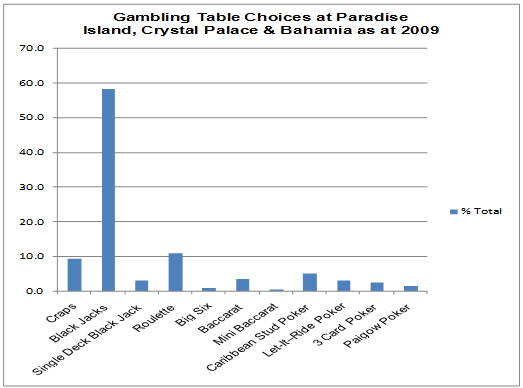
It is evident that black jacks, roulette and craps are the popular entertainment, respectively. Edwards (2009, p.23) adds that slot machines are over 2,226 in the three locations, while the gaming tables are 190. By the end of the 2003 fiscal year, the variety of tables were 11 in the Grand Bahama, Paradise Island and Cable Beach (Edwards 2009, p.23).
This form of data can provide insights into the revenue expectations zeroed-in to the level of per table. Anecdotally, black jack tables attract more revenue and thus are popular in the selected locations. Other factors that determine the choice of the table to invest in is the return on investment.
Table 4: Trend in Percentage (between 2001 and 2007) of Lottery Entertainment Visitor Stopovers vis-a-vis the Overall
Source: Edwards (2009, p.37).
The percentage range (0.8 to 1.1 percent) for visitor stopover for lottery entertainment vis-a-vis overall visitor stop over has experienced dismal growth.
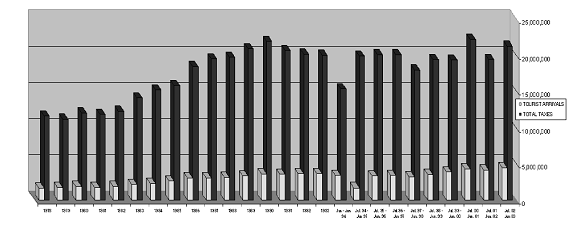
The pattern developed between the visitor stop over numbers and tax revenue from lottery shows a positive correlation. In other words, it is possibly obvious that visitors to The Bahamas are bound to spend proportionately on lottery activities during their stay.
Employment Opportunities in the Lottery Industry
Across the country, tourism activities provide employment to over 38 percent (that is close to 50 000) (Edwards, 2009, p.29). This statistic indicates that for every US$ 1 million spent by guests, there are 35 jobs sustained. According to the Communication (2012, para. 21), the annual cumulated payroll for employees under the web shop category is more than US$ 15 million.
Directly employed opportunities feature more than within the tourism sector such as working in lottery facilities, among others (Edwards, 2009, p.29). There are over 28 indirect employment opportunities in lottery facilities in 1999/2000. Edwards (2009, p.30) lists them as follows (with the percentage of expatriates in brackets).
Source: Edwards (2009).
As shown in the table above, lottery employment opportunities are diverse. In 2002, the number of directly employed staff at lottery stations was 2,747 with expatriates accounting 12 percent. The pie-chart below illustrates this. According to Communication (2012, para.20), in The Bahamas, web shop businesses account for more than 4000 jobs. In 2002, the Atlantis Paradise Island Casino led in the number of direct jobs created at 972 employees (Edwards, 2009, p.30).
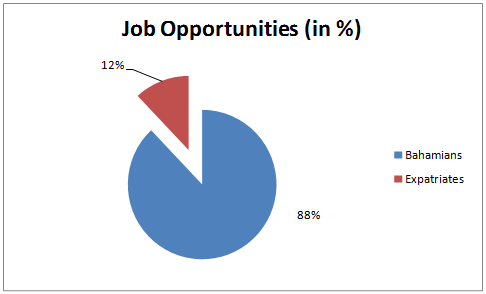
This shows that for every job opportunity going to an expatriate, an approximate nine are created for the locals. Presence of expatriates provides the Bahamas lottery experience an international feeling. These expatriates indicate that remuneration rates for staff are appealing.
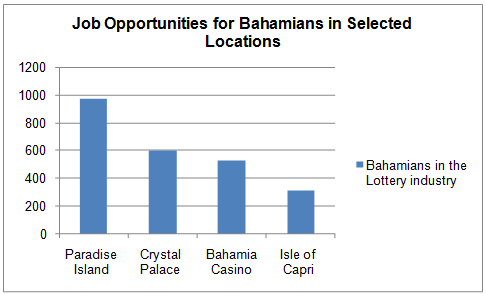
Drawbacks Faced by The Bahamas Lottery Sector: Religious Resistance
Even during the cradle of the Bahamian lottery business religious groupings such as the Bahamas Christian Council opposed the casino development (Edwards 2009, p.39). In opposition to the lottery development issues raised include discouraging decent tourism in The Bahamas; facilitation of social and moral decadence among the residents as well as encourage underworld immigrations and lead to complexities in security enforcement.
While, this religious uprise was high at the advent of the lottery legalization, developments in the recent times show restraint among the stakeholders in the industry leading to tolerance among the religious groupings (Edwards 2009, p.39). Arguably, prohibition of Bahamians in participating as gamblers may have ameliorated any adverse impacts resulting from the activities of gaming thus general consensus to include lottery activities among tourism products.
However, the current calm on the lottery debate may change considering the growing trend into web shop gambling which is a virtual version of the paper casino gambling. Bahamians are not exempted by law (under the Lotteries and Gaming Act) to participate as online (web shop) gamblers.
Financial constraints to secure bank accounts may be a deterrent factor for Bahamian locals to enter into web shop gambling. Regulations on anti-money laundering inflict exorbitant charges (Communication, 2012, para.31). A national legal framework for web shop gambling may be necessary, particularly to direction on Bahamians interested in investing. However, gambling money is perceived as not decent.
Conclusion
The Bahamian economy is anchored on tourism revenue. This is characterized by the dominance of foreign visitors flocking to the country. The economy benefits from financial services as well as state revenue collections generated from taxation regimes on the tourism products and packages.
This means that the influx of visitors is an indicator of the ability of the state to suppress drawbacks while maximizing the opportunities available to better the economy. The success in the Bahamian tourism industry can partly be measured in the ability to sustain mass tourism.
Lottery activities boast a long history in The Bahamas (spanning over nine decades). Flourishing of lottery activities within The Bahamas is attributed to the presence of a robust and booming tourism industry. Statistics show that for every visitor spending worth US$ 1 million in lottery entertainment activities over 35 jobs are sustained. Web shop lottery activities account for over four thousand jobs. In the lottery industry, expatriates account for 12 percent of the employee base in The Bahamas.
This gives the implication of the employment standards in the lottery industry in The Bahamas. The lottery activities survived existence during the cradle years as a supplementary package for tourism entertainment. Now the lottery industry in The Bahamas has grown to the extent of initiating the virtual version where gambles need not to be physically present.
This is known as the web shop gambling. In recognition of the contribution of lottery activities to The Bahamian economy, the Lotteries and Gaming Act was put in place in 1969. A Gaming Board institution was put in place to administer and oversee countrywide lottery activities. In addition, the Board has to advise the responsible minister on pertinent matters, be it legislation or other administrative issues.
The Bahamas government has established four means of generating revenue from the lottery activities. Taxes, licenses as well as working and business permits directly generate revenue to the government. Edwards (2009) provide the direct and gross revenue for the fiscal period July 1999 – June 2000 to be more than US$ 20 million. In the fiscal year 2002/ 2003, revenue collected was US$ 2 million higher.
In the financial year 2007/ 2008, the revenue projections pegged on the lottery was at US$ 28 million. The amount is economically attractive considering the emolument and running deductions leave behind 85 percent net income that is reverting to the economic development of the country. A pattern can be generated for the fiscal proceeds that the industry is economically growing.
It is interesting to understand how the government has been able to maintain the industry economically robust yet the law exempts the Bahamians from participating as gamblers. Over and above, Revenue from table winnings have generated more to the economy yet are even fewer than slot machines. Nevertheless, the growing invest interest in the lottery industry by renowned multinational corporations could partly explain the economic significance.
Web shop gambling alone generates annual revenue of more than US$ 1 million yet there exists no national frameworks to leverage its activities. The stop over visitor numbers engaging in lottery entertainment has undergone minimal growth compared to the overall visitor numbers. Nevertheless, tax revenue from lottery activities has had a positive association with visitor stopover numbers over the time.
Population dynamics and geography present challenge to the full commercialization of lottery activities in the Bahamas. The proximity to stiff competitors like the State of Florida in the USA explains this challenge. Actually, The Bahamas is losing lottery business opportunities to the state of Florida due to the friendly lottery spending environment even for the Bahamians.
Unless, the government takes an accelerated and forward thinking step while diversifying the lottery entertainment packages then the revenue that would likely destined into The Bahamas will end up to its competitors.
The initially perceived negative social and moral impacts of legalizing lottery activities in The Bahamas have over the time waned off. The legal exemption of the Bahamians from participating in lottery activities as gamblers may have made the significant difference. However, with the existence of the web shop gambling that does not exempt Bahamians it still remains unclear whether the moral and ethical issues are completely addressed amicably.
Regulators may have to forgo moral and ethical strictness allowing more economic liberty in order for business owners to break even particularly in the web shop gambling. Web shop gambling requires heavy capital investment that is not readily available among the Bahamians. Other business risks including security may present more barriers of entry for the Bahamians interested in investing in web shop gambling.
Having a legal framework in place to regulate lottery activities has not benefited the government, economically but also weather down any barriers of entry for international investors. Probably, this presents the likely path for the government in order to enable the Bahamians to equally benefit from the opportunities originating from the development of the gaming industry; a case in point is the web shop gambling.
References
Boxill, I. (2009). Casino Gambling in Jamaica: Lessons and Policy Options. In J Cheesman (Eds.), Jamaica’s Casino Initiative: The Policy Options (pp.1-17). Mona Campus: The University of the West Indies.
Communication By The Right Honourable Perry G. Christie, Prime Minister And Member For Centreville Re: Referendum On National Lottery And Web Shop Gaming. (2012). Web.
Edwards, J. (2009). Casino Gambling and The Bahamian Economy: Development, Economic Impacts and Competitiveness Issues. In J Cheesman (Eds.), Jamaica’s Casino Initiative: The Policy Options (pp.18-43). Mona Campus: The University of the West Indies.
Karagiannis, N. and Madjd-Sadjadi, Z. (2011). Framing The Bahamian Developmental State: An Alternative Policy Package To Neoliberal Failure. International Journal of Peace and Development Studies, 2(4), 96-109. Web.